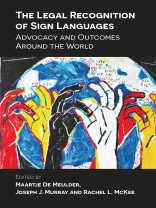This book presents the first ever comprehensive overview of national laws recognising sign languages, the impacts they have and the advocacy campaigns which led to their creation. It comprises 18 studies from communities across Europe, the US, South America, Asia and New Zealand. They set sign language legislation within the national context of language policies in each country and show patterns of intersection between language ideologies, public policy and deaf communities’ discourses. The chapters are grounded in a collaborative writing approach between deaf and hearing scholars and activists involved in legislative campaigns. Each one describes a deaf community’s expectations and hopes for legal recognition and the type of sign language legislation achieved. The chapters also discuss the strategies used in achieving the passage of the legislation, as well as an account of barriers confronted and surmounted (or not) in the legislative process. The book will be of interest to language activists in the fields of sign language and other minority languages, policymakers and researchers in deaf studies, sign linguistics, sociolinguistics, human rights law and applied linguistics.
Зміст
Maartje De Meulder, Joseph J. Murray and Rachel L. Mc Kee: Introduction: The Legal Recognition of Sign Languages: Advocacy and Outcomes Around the World
Section 1 – Recent Sign Language Laws
Chapter 1. John Bosco Conama:“Ah, That’s Not Necessary, You Can Read English Instead”: An Analysis of State Language Policy Concerning Irish Sign Language and its Effect
Chapter 2. Sung-Eun Hong, Hyunhwa Lee, Mi-Hye Lee and Seung-Il Byun: The Korean Sign Language Act
Chapter 3. Marie Azzopardi-Alexander, Karl Borg, Dorianne Callus, Keith Callus, Steven Mulvaney, Alison Vere, Annabelle Xerri and Loran Ripard Xuereb : The Road to Maltese Sign Language Recognition
Chapter 4. Lilian Lawson, Frankie Mc Lean, Rachel O’Neill and Robert Brian Wilks: Recognising British Sign Language in Scotland
Section 2 – Implicit Legal Recognition
Chapter 5. Deniz İlkbaşaran and Okan Kubus: A Roof Without Foundation: Shifts in the Legal and Practical Status of Turkish Sign Language (TİD) Since 2005
Chapter 6. Soya Mori and Atsubumi Sugimoto: Progress and Problems in the Campaign for Sign Language Recognition in Japan
Chapter 7. Joseph J. Murray: American Sign Language Legislation in the United States
Chapter 8. Maribel González, Andrea Pérez, Juan Luis Marín and Camila Villavicencio: Towards the Recognition of Chilean Sign Language
Chapter 9. Yann Cantin, Florence Encrevé and Marie-Thérèse L’Huillier: The Societal and Political Recognition of French Sign Language (LSF) in France: 1970-2018
Section 3 – On-going Campaigns Towards Explicit Legal Recognition
Chapter 10. Richard Cokart, Trude Schermer, Corrie Tijsseling and Eva Westerhoff: In Pursuit of Legal Recognition of The Netherlands
Chapter 11. Carlo Geraci and Humberto Insolera: The “Language Issue”: The Struggle and Path for the Recognition of LIS
Chapter 12. Arnfinn Muruvik Vonen and Paal Richard Peterson: Sign Language Legislation in Norway
Section 4 – Implementation of Sign Language Laws
Chapter 13. Franz Dotter, Verena Krausneker, Helene Jarmer and Lukas Huber: Austrian Sign Language: Recognition Achieved but Discrimination Continues
Chapter 14. Rachel L. Mc Kee and Victoria Manning: Implementing Recognition of New Zealand Sign Language: 2006-2018
Chapter 15. Valgerður Stefánsdóttir, Ari Pall Kristinsson and Julia G. Hreinsdottir: The Legal Recognition of Icelandic Sign Language: Meeting Deaf People’s Expectations?
Chapter 16. Ronice Müller De Quadros and Marianne Rossi Stumpf: Recognizing Brazilian Sign Language: Legislation and Outcomes
Chapter 17. Maria Josep Jarque, Marta Bosch-Baliarda and Menchu González: Legal Recognition and Regulation of Catalan Sign Language
Chapter 18. Maartje De Meulder and Thierry Haesenne: A Belgian Compromise? Recognising French-Belgian Sign Language and Flemish Sign Language
Chapter 19. Maartje De Meulder, Joseph J. Murray and Rachel L. Mc Kee: Epilogue: Claiming Multiple Positionalities: Lessons from the First Two Decades of Sign Language Recognition
Про автора
Maartje De Meulder is a senior researcher and lecturer at the University of Applied Sciences Utrecht in the Netherlands. Her expertise is in sign language planning and policy, sign language interpreting from a socio-political perspective, and discourses surrounding inclusive education. She has published in a range of different journals and is co-editor of Innovations in Deaf Studies (Oxford University Press, 2017) and The Legal Recognition of Sign Languages (Multilingual Matters, 2019).












